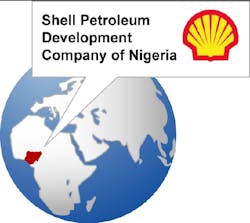Shell Petroleum Development Company of Nigeria (SPDC) produces 43 percent of Nigeria's oil, and is the pioneer and leader of Nigeria's petroleum industry. Operating in the Niger Delta and adjoining shallow offshore areas, Shell has more than 3,000 kilometers of pipelines, 87 flowstations, eight gas plants and more than 1,000 wells.
SPDC monitors and controls its upstream production process from more than 1,000 wells via distributed control systems (DCSs,) Fisher ROC Remote Terminal Units (RTUs) and Modbus-brand programmable logic controllers (PLCs). The company collects field data in a central location by linking to its DCSs, RTUs and PLCs via satellite and radio.
Initially, a UNIX-based system facilitated the data collection process by using various custom interfaces to communicate with the remote RTUs and PLCs.
This legacy system soon outlived its usefulness. Limitations included difficulty in producing reports, a restricted number of concurrent users and bugs in the software. As well, the system did not use a standards-based communication infrastructure, so the number and type of applications available to access, report on, and trend the process data were limited. Besides, the system was not user-friendly and was very difficult to maintain and configure. It also did not allow for remote device configuration.
For SPDC to continue using the UNIX system, custom interfaces would be required. However, SPDC demanded a more robust infrastructure that would provide the required scalability and flexibility to improve process management. Custom interface development was expensive and time consuming, not to mention that the company would then be "locked" into its existing vendor, thereby constraining the business process.
Solution: A Standards Platform
SPDC had two options. One was to keep its existing infrastructure and develop the custom applications that were needed. The second was to replace its legacy system altogether. SPDC decided on the second option because everything it needed was available as commercial-off-the-shelf software.
SPDC selected OPC as the communication technology. OPC is a published communication standard that enables products from many vendors to interface with each other; consequently, it provided Shell with a flexible and scalable platform for growth, and a best-of-breed solution.
SPDC replaced its proprietary UNIX-based system with a standards-based Microsoft Windows- and OPC-based system. The company chose server products from MatrikonOPC, based in Edmonton, Alberta, Canada, and installed the MatrikonOPC Server for Fisher ROC to interface with the RTUs, and the MatrikonOPC Server for Modbus to interface with the PLCs. The new Windows system collected the field data via OPC, and stored the data in a local process historian from OSIsoft, San Leandro, Calif. Since the OSIsoft PI historian was already enabled with OPC, interfacing with the MatrikonOPC software was seamless. This enabled Shell to use PI ProcessBook for reporting, trending and visualization from all its wells.
SPDC's Process Control Engineer Kikelomo Afolabi said, "MatrikonOPC proved to be a cost effective, easy to integrate and robust solution, providing true interoperability that aligned well with Shell's need for scalability."
For more information about MatrikonOPC, visit www.matrikonopc.com.

